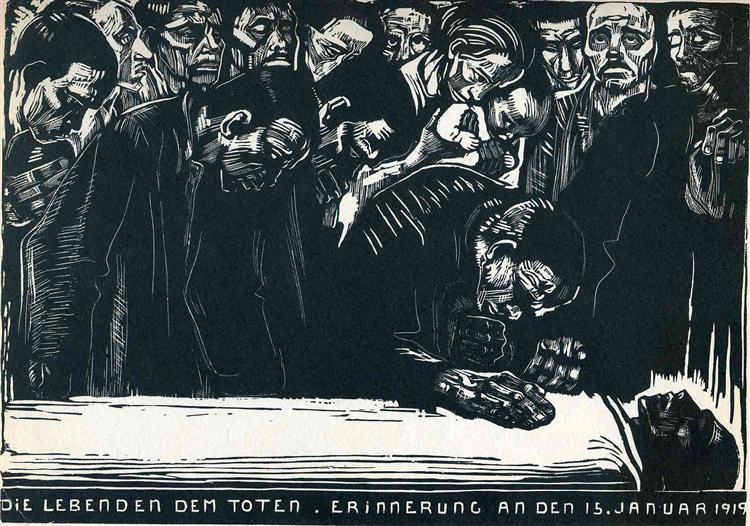Description
The work "Monument to Karl Liebknecht" by Käthe Kollwitz, created in 1919, stands as a deep tribute to the figure of Liebknecht, a prominent German politician and one of the leaders of the spontaneous revolution of 1918-1919. This painting is not only inscribed in the history of the representation of social realism, but also reflects Kollwitz's concern for social injustices and human suffering.
In the piece, the artist uses a palette of dark and gloomy tones, often predominantly black and gray, which seize the scene with a palpable sadness. This chromatic choice is not accidental; It moves the viewer to the atmosphere of desolation that followed the death of Liebknecht, in a postwar context that was marked by political agitation and class struggle. The use of color and light becomes a powerful tool that emphasizes the severity of the topic discussed.
The artistic composition is characterized by its verticality, evoking a sense of monument, a tangible tribute that transcends the physical space. When observing the work, you can see the way in which Kollwitz positions the figures so that they seem to embrace and surround the central figure, which suggests not only the duel for the loss, but also a sense of unity and resistance. This arrangement of the figures results in a compositional solidity that reinforces the idea of a lasting legacy.
Käthe Kollwitz, recognized for his interest in the representation of suffering and human dignity, incorporates in this work his characteristic style, influenced by expressionism and realism. His figures, which often seem to be alive and loaded with emotion, reflect a deep connection with collective suffering, a recurring theme in their work. In "Monument to Karl Liebknecht", not only Liebknecht is represented, but appeals to a broader sense of the struggle for justice and equality, becoming a symbol of resistance to oppression.
It is important to mention that, in Kollwitz's creative process, his own biography affected his art. The experience of war, personal losses and political commitment led her to develop a critical look towards the reality that surrounded her. Through his work, the spectator not only visualizes a work of art, but also faces the echo of the forgotten voices that cry for justice.
In the context of his work, the "monument to Karl Liebknecht" is not a simple representation; It is a statement about memory, duel and hope. The figure of Liebknecht thus becomes a vehicle to explore the complexities of the social struggle. In this work, Kollwitz manages to merge a personal story with a collective narrative, establishing a dialogue that remains relevant today. The emotional depth and the vigorous social criticism emanating from this painting continue to resonate, reaffirming the role of Kollwitz as one of the great teachers of the committed art of the twentieth century.
KUADROS ©, a famous paint on your wall.
Hand-made oil painting reproductions, with the quality of professional artists and the distinctive seal of KUADROS ©.
Art reproduction service with satisfaction guarantee. If you are not completely satisfied with the replica of your painting, we refund your money 100%.

